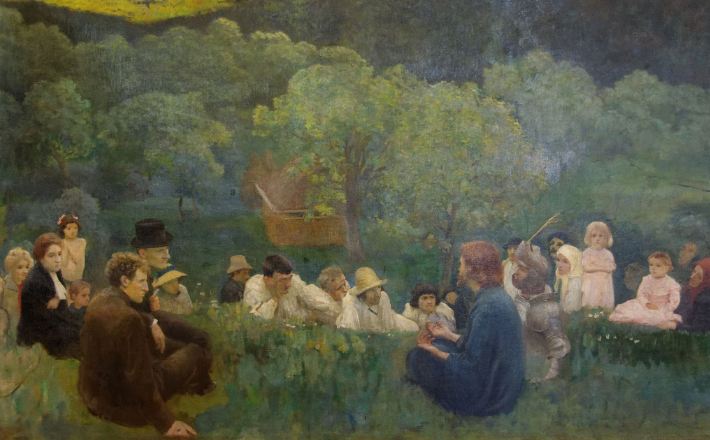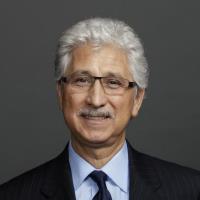Commentary on Matthew 5:1-12
Galilee was outside the mainstream of Israelite life. It was neither a religious nor an intellectual center, with no real political power. Galilee was, however, in contact with world trade and culture and because of that it became a very cosmopolitan region. Peoples from different ethnic backgrounds inhabited the area, making it very diverse in terms of culture and religion. For that very reason Galileans were suspected of not being Jewish enough. Their mixedness (mestizaje) made them unclean and so they were rejected by Pharisees and the Jerusalem priests.
Out of this context of marginality comes Jesus, who in Matthew is depicted as the Jewish Messiah. In chapter 5 he goes up a mountain like Moses, and delivers the Sermon on the Mountain which starts with the famous Beatitudes. Matthew seems to have added some more to the Lukan list of four (Luke 6:17-26), which is probably more original. He has also spiritualized them a little (poor in spirit, hunger and thirst for righteousness, et cetera). The four original beatitudes may have been: Blessed are you who are poor, blessed are you who are hungry now, blessed are you who weep now, blessed are you when people hate you … exclude you … revile you … and defame you.
“Blessed” is honorific language. It can be translated as “How honorable,” “How full of honor,” “How honor bringing,” et cetera. “Contrary to the dominant social values, these “blessed are …” statements ascribe honor to those unable to defend their positions or those who refuse to take advantage of or trespass on the position of another. Obviously then the honor granted comes from God, not from the usual social sources.”¹
Who deserves this honor?
The poor (in spirit). For Matthew they were not the economically poor but those unable to maintain their inherited honor standing in society because of misfortune or the injustice of others. A rich widow without a son was still a “poor widow” regardless of how wealthy she was. Social misfortune, not economic misfortune was that which made a person poor. Of course, economic misfortune or economic oppression would make a person poor also.
To be labeled poor was to be unable to defend what was yours, to fall below the status at which one was born. (By the same token today, to call people “illegal” is to make them fall below the status at which they were born because no person is ever born “illegally.”)
The poor are those who are not given honor, hence socially weak, while the rich are the greedy, the shamelessly strong. Within the same context belong those persecuted unjustly and those reviled falsely. If persecution here means being driven out of their families, then it is no wonder that they are also hungry and mourning. They have lost their supporting system and are forced to beg for food. They are unable to maintain their inherited honor and have fallen in disgrace and shame. But, despite all that, they are granted the highest honor: the kingdom of heaven.
Merciful, pure in heart, and peacemakers have to do with moral qualities a person is to acquire.
- Mercy refers to the obligation to repay debts of interpersonal relationships (parents/children, patrons/clients, spouses to each other, et cetera). To be merciful is to be willing to repay those debts. God will do the same.
- Pure of heart means to have one’s thinking and feeling faculties attuned to what pleases God, something like our word “conscience.” They will see God. This is pilgrimage language, says Malina.² To see God’s sanctuary at Jerusalem was the goal of pilgrims. These joys and experiences are now available to those who are pure in heart.
- Peacemakers, Shalom-makers, are those who strive for whatever is necessary for meaningful human existence. They will be honored with inclusion in God’s family: “children of God.”
Jesus, the marginal and migrant Messiah, can bless others not because he has possessions that he can dispense (we know Jesus was poor) or honor that he can grant (we know he was without honor in that society), but because he is acutely aware of God’s presence which he mediates, as a broker, to others. Going against the official theology of Israel, the great tradition emanating from Jerusalem, Jesus, as spokesperson for the little tradition of Galilee, blesses those who were despised by the society of the time. He turns the values of his time on their head by announcing that God blesses the unblessed. “… Jesus revalues what has been disvalued; he honors what has been shamed.”³ Jesus changes the way the honor game is played and redefines the source of honor. Acknowledgment of honor comes from God, he says, not from neighbors.4
The implication of Jesus blessing the poor, the marginalized, is not that they should be happy in their deprivation, for even though they may be poor materially they surely are rich spiritually! No. It is more an indictment on the society of the time for having forgotten its responsibility toward the neighbor. It is a warning to God’s people. It is a call to accountability, for if God blesses the ones that you curse, there is something fundamentally wrong with your theology. In the last analysis, Jesus is questioning the way God was being understood by the religious and political leaders of Israel at the time.
Rocks come from mountains.
Sitting on a mountain, Jesus, a Galilean Jew, declares the marginal of his society as blessed and deserving of God’s kingdom. He describes them as peacemakers, merciful, meek and, because of that, persecuted. Two thousand years later some of his compatriots have to take rocks from the very same mountains to defend the peace they have been striving for. Their rocks are met with bullets from the Israeli army. Then, out of desperation, the rocks turn into human bombs.
Under the hot desert sun, a line of “illegal” immigrants is making its way towards the border between Mexico and the USA. There are adults and children in the group. They carry a few possessions, mostly water for the journey. Suddenly a helicopter hovers over them and they all run for cover. In desperation one of the men picks up a rock and throws it at the helicopter. Then he finds a place under a bush and hides. Soon after that a border patrol van pulls over and takes them into custody. Later that day they are all deported back to Mexico.
For further reflection
Where would Jesus sit today if he had to deliver again the Sermon on the Mountain? On Wall Street? Washington D.C.? Calcutta? Buenos Aires? Gaza City? Darfur? Tijuana? On one of the many churches erected in his name? And who would be the ones he declares “blessed,” “honored?” If we can answer these questions, then perhaps we can answer the question that has puzzled the church for two millennia: what is the purpose of the church? What are we here for? What does it mean to inherit the kingdom of God? What is the kingdom of God? What is our understanding of God?
Notes:
- Bruce J. Malina and Richard L. Rohrbaugh, Social-Science Commentary on the Synoptic Gospels (Minneapolis, MN: Fortress Press, 1992), 47.
- Malina and Rohrbaugh, Social-Science Commentary, 49.
- Jerome Neyrey, Honor and Shame in the Gospel of Matthew (Louisville, KT: Westminster John Knox Press, 1998), 167.
- Neyrey, Honor and Shame, 164.



November 5, 2023